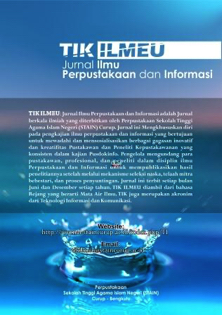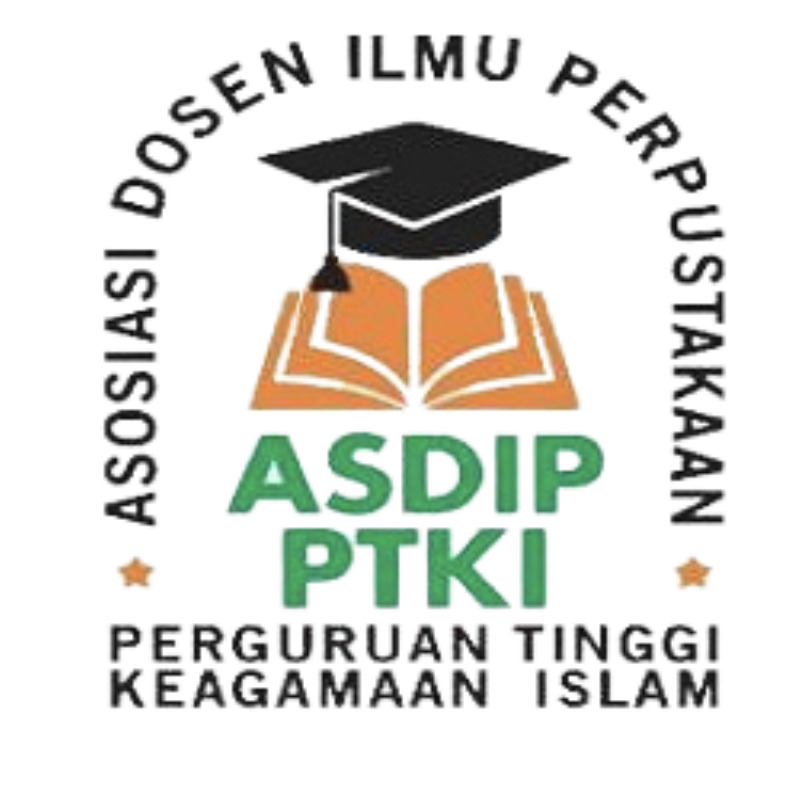Pemetaan dan Analisis Bibliometrik Tren Penelitian: Manajemen Diseminasi Informasi di Scopus tahun 2018-2023 dengan VOSviewer dan RStudio Bibliometrix
DOI:
https://doi.org/10.29240/tik.v8i2.9776Keywords:
Bibliometrik, Manajemen Diseminasi Informasi, Diseminasi Informasi, Strategi Penyebaran InformasiAbstract
Penelitian ini dimaksudkan untuk mengkaji perkembangan topik manajemen diseminasi informasi, dengan tujuan untuk mengetahui: (1) Bagaimana jumlah perkembangan publikasi ilmiah internasional mengenai topik manajemen diseminasi informasipada tahun 2018 - 2023 di Scopus; (2) Berapa banyak jumlah jurnal inti dalam publikasi internasional pada topik manajemen diseminasi informasipada tahun 2018 - 2023 di Scopus; (3) Bagaimana peta perkembangan publikasi internasional penelitian topik manajemen diseminasi informasiberdasarkan kata kunci pada tahun 2018 - 2023 di Scopus. Pengumpulan data dengan melakukan penelusuran melalui Scopus dengan kata kunci dan filtrasi data yang telah disesuaikan kebutuhan. Subjek dianalisis dan divisualisasikan dengan Microsoft Excel, Scopus Result Analyzer, VOSviewer, dan Rstudio (Bibliometrix) . Hasil penelitian menunjukkan bahwa tren perkembangan topik manajemen diseminasi informasipada tahun 2018 hingga 2023 di Scopus mengalami puncaknya pada tahun 2020 dengan jumlah artikel sebanyak 204 artikel. Sedangkan penerbit Jurnal Inti dengan peringkat satu adalah Jurnal BMJ Open yang menerbitkan 80 artikel pada topik manajemen diseminasi informasi.
Â
Hasil pemetaan memberikan gambaran bahwasanya topik ini memiliki potensi berkembang apabila ada proses pengembangan strategi yang tepat, banyak hal juga yang mempengaruhi efisiensi penyebaran informasi termasuk suatu fenomena yang signifikan seperti pandemic. Untuk penelitian selanjutnya peneliti dapat memberikan saran agar organisasi manajemen diseminasi informasi meningkatkan pemahaman terhadap fluktuasi tren publikasi, memperluas cakupan geografis, kolaborasi lintas sektor, dan fokus pada kecepatan serta adaptabilitas dalam menghadapi tantangan
Downloads
References
Apuke, O. D., & Omar, B. (2020). Fake news and COVID-19: modelling the predictors of fake news sharing among social media users. Telematics and Informatics. https://doi.org/10.1016/j.tele.2020.101475
Araújo Vila, N., Fraiz Brea, J. A., & Cardoso, L. (2019). The Influence of Sociodemographic Variables on Audiovisual Consumption: The Case of Spain . In Social sciences (Basel) (Vol. 8, Issue 8, p. 239). MDPI AG . https://doi.org/10.3390/socsci8080239
Borah, P. (2015). Blog Credibility: Examining the Influence of Author Information and Blog Reach. Atlantic Journal of Communication, 23(5), 298–313. https://doi.org/10.1080/15456870.2015.1092740
Borowski, P. F. (2022). Digital Transformation and Prosumers Activities in the Energy Sector. In Intelligent Systems in Digital Transformation: Theory and Applications (pp. 129–150). Springer.
Brashier, N. M., & Schacter, D. L. (2020). Aging in an Era of Fake News. Current Directions in Psychological Science, 29(3), 316–323. https://doi.org/10.1177/0963721420915872
Chan, N., Zhang, Q., & Peipei, L. (2021). Research on community information dissemination
under public emergency . In 2021 International Conference on Public Management and Intelligent Society (PMIS) (pp. 119–122). IEEE . https://doi.org/10.1109/PMIS52742.2021.00033
Chunly, S. (2020). Social media and counterpublic spheres in an authoritarian state: Exploring online political discussions among Cambodian Facebook users. Discourse, Context and Media, 34. https://doi.org/10.1016/j.dcm.2020.100382
Donthu, N., Kumar, S., Mukherjee, D., Pandey, N., & Lim, W. M. (2021). How to conduct a bibliometric analysis: An overview and guidelines. Journal of Business Research, 133, 285–296.
Faisal, P., & Kisman, Z. (2020). Information and communication technology utilization effectiveness in distance education systems. International Journal of Engineering Business Management, 12. https://doi.org/10.1177/1847979020911872
Gichohi, P. M., Onyancha, O. B., & Dulle, F. W. (2017). How public libraries in Meru County, Kenya, address the business information needs of small-scale enterprises. Information Development, 33(4), 418–435. https://doi.org/10.1177/0266666916667998
Guleria, D., & Kaur, G. (2021). Bibliometric analysis of ecopreneurship using VOSviewer and RStudio Bibliometrix, 1989–2019. Library Hi Tech, 39(4), 1001–1024.
Hou, Y., & Yu, Z. (2023). A Bibliometric Analysis of Synchronous Computer-Mediated Communication in Language Learning Using VOSviewer and CitNetExplorer.
Education Sciences, 13(2), 125.
Irena, B., & Erwin Budi Setiawan. (2020). Fake News (Hoax) Identification on Social Media Twitter using Decision Tree C4.5 Method. Jurnal RESTI (Rekayasa Sistem Dan Teknologi Informasi), 4(4), 711–716. https://doi.org/10.29207/resti.v4i4.2125
Lahiri, A., & Dey, D. (2018). Versioning and Information Dissemination: A New Perspective
. In Information systems research (Vol. 29, Issue 4, pp. 965–983). INFORMS . https://doi.org/10.1287/isre.2017.0763
Li, Z., & Liu, X. (2022). How does risk information dissemination affect risk contagion in the interbank market? . In M. Karsai (Ed.), PloS one (Vol. 17, Issue 7, pp. e0270482– e0270482). Public Library of Science . https://doi.org/10.1371/journal.pone.0270482
Ljungberg, E. (2020). Media practices in the making of an “other spaceâ€: Communicating inclusion, exclusion, and belonging in a controversial heterotopia. New Media and Society, 22(12), 2166–2182. https://doi.org/10.1177/1461444819888399
McAllister, J. T., Lennertz, L., & Atencio Mojica, Z. (2022). Mapping A Discipline: A Guide to Using VOSviewer for Bibliometric and Visual Analysis . In Science & technology
libraries (New York, N.Y.) (Vol. 41, Issue 3, pp. 319–348). Routledge . https://doi.org/10.1080/0194262X.2021.1991547
Muhammad, J. S., Isa, A. M., Samsudin, A. Z. H., & Miah, S. J. (2020). Critical factors for implementing effective information governance in Nigerian universities: A case study investigation. Education and Information Technologies, 25, 5565–5580.
Solehuddin, M., Muktiarni, M., Rahayu, N. I., & Maryanti, R. (2023). Counseling guidance in science education: Definition, literature review, and bibliometric analysis. Journal of Engineering Science and Technology, 18, 1–13.
Srisuwan, W., Sabhasri, C., Chansue, N., & Haetrakul, T. (2022). Using biomimicry and bibliometric mapping to guide design and production of artificial coral reefs . In Marine environmental research (Vol. 180, p. 105685). Elsevier Ltd . https://doi.org/10.1016/j.marenvres.2022.105685
Thor, A., Marx, W., Leydesdorff, L., & Bornmann, L. (2016). Introducing CitedReferencesExplorer (CRExplorer): A program for reference publication year spectroscopy with cited references standardization. Journal of Informetrics, 10(2), 503– 515. https://doi.org/https://doi.org/10.1016/j.joi.2016.02.005
Tombleson, B., & Wolf, K. (2017). Rethinking the circuit of culture: How participatory culture has transformed cross-cultural communication. Public Relations Review, 43(1), 14–25. https://doi.org/10.1016/j.pubrev.2016.10.017
Tupan, T. (2022). Analisis bibliometrik perkembangan potensi energi baru dan terbarukan di Indonesia menggunakan R Biblioshiny dan VosViewer. Daluang: Journal of Library and Information Science, 2(2), 71–81.
Weeks, B. E., Ardèvol-Abreu, A., & De Zúñiga, H. G. (2017). Online influence? Social media use, opinion leadership, and political persuasion. International Journal of Public Opinion Research, 29(2), 214–239. https://doi.org/10.1093/ijpor/edv050
Wu, J. J., Chen, Y. H., & Chung, Y. S. (2010). Trust factors influencing virtual community members: A study of transaction communities. Journal of Business Research, 63(9–10), 1025–1032. https://doi.org/10.1016/j.jbusres.2009.03.022
Zhang, J., Wang, X., & Chen, S. (2023). Study on the interaction between information dissemination and infectious disease dissemination under government prevention and management . In Chaos, solitons and fractals (Vol. 173, p. 113601). Elsevier Ltd . https://doi.org/10.1016/j.chaos.2023.113601
Downloads
Published
Issue
Section
Citation Check
License
Copyright (c) 2024 Ayunda Trisna Ludi Tiara

This work is licensed under a Creative Commons Attribution-NonCommercial-ShareAlike 4.0 International License.
Authors who publish with Tik Ilmeu : Jurnal Ilmu Perpustakaan dan Informasi agree to the following terms:
- Authors retain copyright and grant the journal right of first publication with the work simultaneously licensed under a Creative Commons Attribution-NonCommercial-ShareAlike 4.0 International License (CC BY-NC-SA 4.0) that allows others to share the work with an acknowledgment of the work's authorship and initial publication in this journal.
- Authors are able to enter into separate, additional contractual arrangements for the non-exclusive distribution of the journal's published version of the work (e.g., post it to an institutional repository or publish it in a book), with an acknowledgment of its initial publication in this journal.
- Authors are permitted and encouraged to post their work online (e.g., in institutional repositories or on their website) prior to and during the submission process, as it can lead to productive exchanges, as well as earlier and greater citation of published work (See The Effect of Open Access).







 This work is licensed under a
This work is licensed under a 